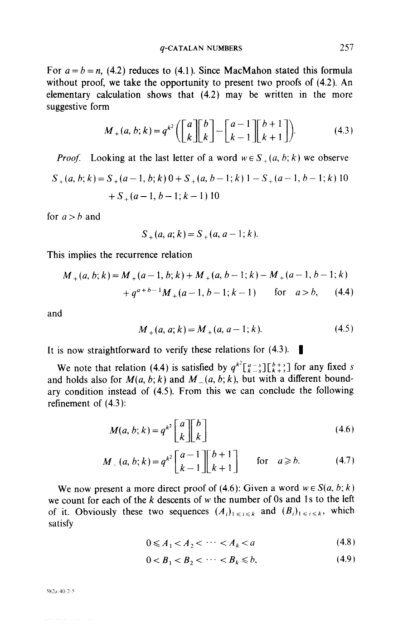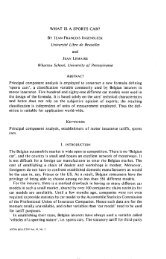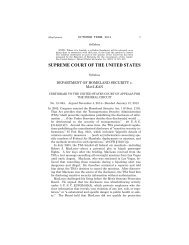85jct_catalan
You also want an ePaper? Increase the reach of your titles
YUMPU automatically turns print PDFs into web optimized ePapers that Google loves.
q-CATALAN NUMBERS 257<br />
For a = b = n, (4.2) reduces to (4.1). Since MacMahon stated this formula<br />
without proof, we take the opportunity to present two proofs of (4.2). An<br />
elementary calculation shows that (4.2) may be written in the more<br />
suggestive form<br />
M, (a, b; k) = qk2 ([i][L]-[f-:1[K]).<br />
(4.3 1<br />
Proof: Looking at the last letter of a word w E S, (a, b; k) we observe<br />
~+(a,b;k)=S+(a-1,b;k)O+S+(a,b-1;k)1-S+(u--1,b-1;k)1o<br />
+S+(u-Lb-l;k-1)lO<br />
for u>h<br />
and<br />
S+(u,u;k)=S+(u,u-1;k).<br />
This implies the recurrence relation<br />
and<br />
M+(u,b;k)=M+(u-1,b;k)+M+(u,b-1;k)-M+(a-1,b-1;k)<br />
+9 “+b-lM+(u-l,b-l;k-l) for a>b, (4.4)<br />
M+(u,u;k)=M+(u,u-1;k). (4.5)<br />
It is now straightforward to verify these relations for (4.3). 1<br />
We note that relation (4.4) is satisfied by qkZ[;::;] [i zi] for any fixed s<br />
and holds also for M(u, b; k) and M-(a, 6; k), but with a different boundary<br />
condition instead of (4.5). From this we can conclude the following<br />
refinement of (4.3):<br />
M(u, b; k) = qk2 ; ; (4.6)<br />
[ IL 1<br />
M. (a, b; k) = qk2 [~I:][~~~] for u2b. (4.7)<br />
We now present a more direct proof of (4.6): Given a word w E S(u, 6; k)<br />
we count for each of the k descents of w the number of OS and 1 s to the left<br />
of it. Obviously these two sequences (Ai), QiGk and (B;),





